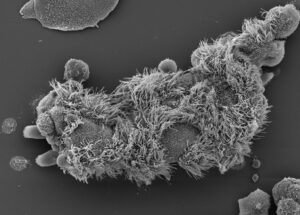The creation of an effective diagnostic algorithm to accelerate the diagnosis of PCD in the Slavic population was possible thanks to the development of a mutation frequency profile specific for this population at our Institute.
What is PCD?
 Primary ciliary dyskinesia (PCD) belongs to ciliopathies – diseases caused by hereditary dysfunction of the movable cilia. PCD manifests itself early in life. If wrongly diagnosed and left untreated, it can lead to serious symptoms such as bronchiectasis or chronic obstructive pulmonary disease. Knowledge of the genetic basis of molecular disorders is an extremely important element of effective diagnostics, allowing for early treatment.
Primary ciliary dyskinesia (PCD) belongs to ciliopathies – diseases caused by hereditary dysfunction of the movable cilia. PCD manifests itself early in life. If wrongly diagnosed and left untreated, it can lead to serious symptoms such as bronchiectasis or chronic obstructive pulmonary disease. Knowledge of the genetic basis of molecular disorders is an extremely important element of effective diagnostics, allowing for early treatment.
For over 20 years, at the Department of Molecular and Clinical Genetics of the IHG PAS, we have been conducting research on the genetic basis, diagnostics and epidemiology of PCD and the relationship between mutations and the structure and function of movable cilia, as well as studies on the formation of ciliary cells and analysis of the influence of external factors on the functioning of cilia in health and disease.
What is PCD diagnosis?
The Institute of Human Genetics, PAS is the only national center that conducts this type of analysis. These studies are, in a sense, personalized, unique, as they concern the Slavic population – a group that has so far been insufficiently characterized. The Institute’s research led to the development of a mutation frequency profile, which for the Polish/Slavic population turned out to be unique and different from Western European populations. On its basis, a population-specific, effective diagnostic algorithm was developed, significantly accelerating the analysis of the genetic basis of PCD and enjoying a growing interest among pulmonologists. An important element of cooperation with clinical centers is the expertise of the Department’s employees in the assessment of ciliary movement disorders directly in patients and defects of cilia ultrastructure, allowing to confirm the clinical diagnosis and specify the nature of the defect and focus the analysis of its genetic basis.
Molecular research and personalized medicine
Accurate knowledge of the genetic basis of PCD and the biology of cilia is also a bridge to research in the field of personalized medicine. The research on the stimulation of reading of premature STOP codon (PTC) carried out at the Department contributes to the development of potential therapeutic modules. Obtaining basic knowledge on the effectiveness of translational reading of PTC in the specific context of mutations in specific genes, the influence of the chemical compounds used and their concentration on the viability and function of cells is a necessary element enabling further research on the possibility of using this strategy in PCD therapy.
Popularization of research on PCD
 Our employees take an active part in popularizing knowledge about PCD (organization of workshops and lectures at conferences for clinicians). As a result, the number of medical centers interested in studying the genetic basis of PCD is systematically growing; The recipients of PCD diagnostic tests performed at the IHG PAS are doctors from all over Poland (including Poznań, Karpacz, Bydgoszcz, Toruń, Szczecin). On an international scale, IHG PAS cooperates with clinicians from Slovakia (Martin Comenius University in Bratislava) and the Czech Republic (Charles University, University Hospital Motol, Prague). So far, several hundred positive test results (ended with finding a mutation in the patient) have been issued, including over 30 for foreign centers.
Our employees take an active part in popularizing knowledge about PCD (organization of workshops and lectures at conferences for clinicians). As a result, the number of medical centers interested in studying the genetic basis of PCD is systematically growing; The recipients of PCD diagnostic tests performed at the IHG PAS are doctors from all over Poland (including Poznań, Karpacz, Bydgoszcz, Toruń, Szczecin). On an international scale, IHG PAS cooperates with clinicians from Slovakia (Martin Comenius University in Bratislava) and the Czech Republic (Charles University, University Hospital Motol, Prague). So far, several hundred positive test results (ended with finding a mutation in the patient) have been issued, including over 30 for foreign centers.
Activities for patients
We are actively working to popularize knowledge about PCD, both among patients and doctors. In cooperation with the International Institute of Molecular and Cell Biology in Warsaw, we have organized the first meeting of families with PCD in Poland, during which the Polish Society of Ciliary Dyskinesia was founded – the first organization in Poland that brings together PCD patients and their families. As part of the BESTCILIA project, we took part in the development of the first Polish information materials for PCD patients. We were one of the initiators of establishing a reference hospital in Rabka for patients with PCD. We organize scientific conferences and trainings in Poland, during which doctors have the opportunity to learn about the latest findings about PCD and take part in workshops on various topics related to the diagnosis or treatment of this disease (measuring nitric oxide in the nose with various methods, respiratory physiotherapy, etc.). We take an active part in the development of European guidelines for reporting the results of cilia structure analysis using TEM electron microscopy.